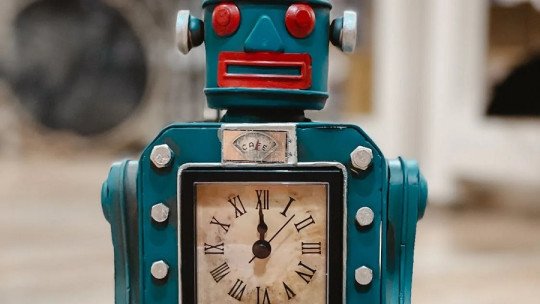Life and the world move forward in a hectic dance, in which time constantly extends and shrinks, taking different forms depending on our emotions and experiences. Our perception of time is often altered based on what we feel or think. For example, spending a fun afternoon with friends may feel very fast, but spending the same time in a class makes us think that life slows down and the clock hands stop turning.
Thus, Some experts suggest that anxiety plays a role in the way we perceive and experience over time Anxiety, that intricate and overwhelming feeling, is a constant companion for many people. Whether by anticipating the future, managing challenges or coping with everyday uncertainty. Anxiety affects our mind in a profound way; Can it also affect how we perceive time?
In this article we are going to examine how anxiety not only shapes our minds and psychology, but can also color the way we experience every second, minute and hour of our lives. We will explore the roots of anxiety, understand how we perceive time, and unravel how these two elements intertwine in the complex tapestry of the human experience.
Understanding anxiety
It is important to first define what anxiety is in order to understand its influence on the perception of time.
Anxiety is an emotion intrinsic to the human experience , an adaptive reaction that has evolved to help us cope with challenging situations. At its most basic form, anxiety is a fight or flight response, preparing our body and mind to respond to real or perceived threats. However, in the modern world, where worries can be abstract and protracted, anxiety can become more complex and problematic.
Imagine that feeling of butterflies in your stomach before giving an important presentation or that palpable unease while waiting for the results of a medical exam. These are common manifestations of anxiety in action. Nevertheless, Anxiety can go beyond these specific moments and become a generalized state that affects daily life Symptoms of anxiety can vary widely, from physical sensations such as palpitations and sweating to persistent worry, restlessness, and even panic attacks. It’s important to remember that anxiety is a personal experience, and what may be overwhelming for one person may be manageable for another.
As we examine how anxiety affects time perception, it is essential to understand that anxiety is more than just an emotion. It involves a complex interaction of biological, psychological and environmental factors.
Our brain and body are intricately connected, and when anxiety is triggered, it triggers a series of physiological and cognitive responses that influence the way we think, feel, and, yes, even the way we perceive time.
How does time perception work?
Time perception is one of those dimensions of human experience that we often take for granted. Although time itself is a constant, the way we perceive it can vary greatly depending on our situation, emotional state, and focal attention. Our brain is constantly processing information and organizing our experiences into temporal sequences. However, this perception is not a simple translation of the seconds passing on the clock. Instead, The brain constructs our temporal experience based on significant events and emotional patterns
When we are immersed in a pleasant or intriguing activity, time tends to “fly.” This is because our focus and attention is completely absorbed in the task, leading to less attention to the details of the time itself. On the other hand, when we find ourselves in boring, anxious, or uncomfortable situations, time can seem to stretch endlessly. Divided attention and a lack of meaningful emotional stimuli can lead to the feeling that time is dragging.
Time perception can also be altered by external stimuli. In dangerous situations, our early warning system can slow down our perception of time, allowing us to process more information and make quick decisions. On the contrary, in moments of relaxation, time may seem to speed up. These phenomena lead us to consider how anxiety, an emotion that often triggers alertness and stress responses, might influence our perception of time.
Impact of anxiety on time perception
The interplay between anxiety and time perception can be surprisingly powerful and often challenging to understand. Typically, weather disruption as a cause of anxiety is explained in two ways:
1. Time dilation
When we experience anxiety, especially in stressful situations, it is common for time to seem to stretch out. Have you ever noticed how minutes seem like hours when you’re waiting for an important response or stuck in an uncomfortable situation? This is because anxiety can sharpen our senses and directing our attention to the details, making each moment feel longer than it really is. Events can seem slowed down, allowing our minds to process each little part of the experience. This time dilation can contribute to the feeling that we are stuck in the moment and increase feelings of discomfort.
2. Understanding time
In contrast, some people experience anxiety as a feeling of urgency and restlessness that can make time fly by. This time compression may be especially evident during times of high anxiety, such as during a crisis or stressful event. The feeling that time is quickly slipping away can lead to a perception of lack of control, intensifying emotional distress
Take a public presentation as an example. For someone anxious, the moments leading up to the presentation could feel like an eternity, with every second filled with worry and anticipation. However, during the presentation itself, time may appear to speed up, causing the experience to end before you can fully absorb what is happening.
Cognitive and neurological mechanisms
The connection between anxiety and time perception originates at the intersection of cognitive and neurological processes that occur in our brain. When we experience anxiety, our brain activates in specific patterns that influence how we perceive and process time.
Importantly, these mechanisms not only influence how we perceive time in situations of acute anxiety, but may also contribute to long-term patterns of time perception. People who experience chronic anxiety may develop a distorted perception of time in general, which affects their relationship with the past, present, and future.
1. Selective attention
One of the key mechanisms linking anxiety and time perception is selective attention. When we are anxious, our attention tends to focus on potential threats, diverting it from other less relevant stimuli This focused attention on anxiety can make moments feel longer as we are processing more detailed information and focusing on the negative aspects of the situation.
2. Memory and reconstruction
Anxiety can also affect the way we remember and reconstruct events. When we are anxious, we are more likely to remember the emotional and distressing details of an experience. These memories can influence how we perceive time retrospectively, as our memory of anxious moments can color our assessment of their duration.
3. Prioritization of stimuli
In anxious situations, our brain tends to prioritize emotional and threatening stimuli. This means that events that might otherwise be perceived as neutral can capture our attention more intensely This heightened perception can influence how we experience time, as events that would normally go unnoticed become more prominent in our awareness.
4. Alteration of brain areas
At a neurological level, anxiety also modulates the activity of brain areas involved in time perception The limbic system, which is related to emotions and decision making, interacts with regions such as the prefrontal cortex, which is involved in planning and evaluation. When these systems interact under the influence of anxiety, they can alter the way we process temporal information.
Coping with time distortion
In the fabric of human experience, anxiety and time perception are intertwined in complex and often surprising ways. Anxiety, an emotion deeply rooted in our nature, can stretch and compress the temporal flow , influencing how we live every moment. Through cognitive and neurological mechanisms, selective attention, memory, and stimulus prioritization combine to shape our perception of time under the influence of anxiety. Recognizing these links allows us to better understand our internal reactions and how to face everyday challenges.
As we continue to explore the relationship between anxiety and time perception, we discover a fascinating window into the interaction between mind and time. By applying mindfulness and anxiety management strategies, we can hope to regain a more balanced sense of time and empower ourselves to navigate the complexity of our emotions in a world in constant motion.









